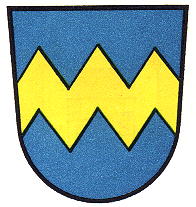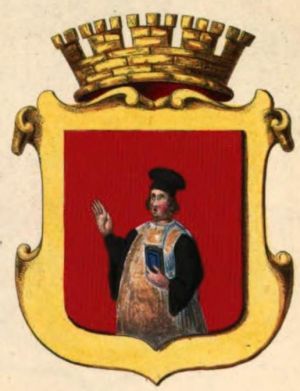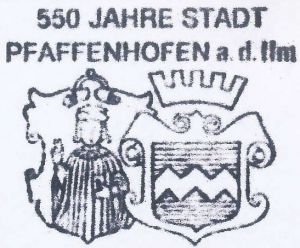Pfaffenhofen an der Ilm: Difference between revisions
Knorrepoes (talk | contribs) m (Text replacement - "manuscript from 1599]]" to "manuscript from 1599]") |
Knorrepoes (talk | contribs) m (Text replacement - "===Official blazon=== *(de) " to "{| class="wikitable" |+Official blazon |- |'''German''' | ") |
||
| Line 9: | Line 9: | ||
[[File:pfaffeni.jpg|center|Wappen von {{PAGENAME}}]] | [[File:pfaffeni.jpg|center|Wappen von {{PAGENAME}}]] | ||
= | {| class="wikitable" | ||
|+Official blazon | |||
|- | |||
|'''German''' | |||
| In Blau ein goldener Zickzackbalken. | |||
===Origin/meaning=== | ===Origin/meaning=== | ||
Revision as of 09:38, 5 July 2022
This page is part of the German heraldry portal Deutsche Wappensammlung |
Heraldry of the World |
|
German heraldry:
|
Selected collector's items from Germany:
|
PFAFFENHOFEN AN DER ILM
State : Bayern
District (Kreis) : Pfaffenhofen an der Ilm
Additions : 1971 Affalterbach, Angkofen, Eberstetten, Ehrenberg, Förnbach, Gundamsried, Haimpertshofen, Niederscheyern, Sulzbach, Tegernbach, Uttenhofen, Walkersbach
| German | In Blau ein goldener Zickzackbalken.
Origin/meaningThe arms were granted on January 5, 1812 by King Max I Joseph of Bavaria. The arms are based on the oldest arms of the Wittelsbach family and with the colours of the arms of the Benedictine monastery in Scheyern. From the 13th century until 1812 the city used a monk sitting on bench on its seals and arms. The monk (Pfaffe) is canting.
Contact and SupportPartners: Your logo here ?
© since 1995, Heraldry of the World, Ralf Hartemink Literature : Stadler, 1964-1971, 8 volumes; Hupp, O: Kaffee Hag albums, 1920s |




















